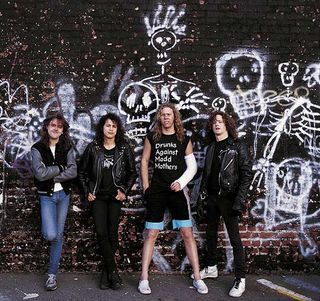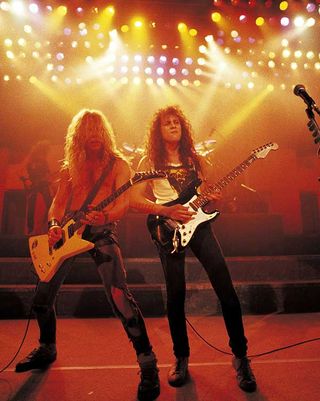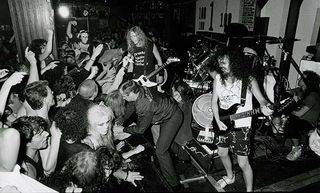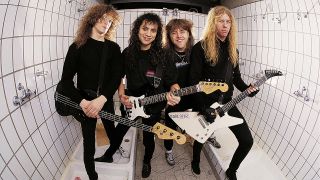It was, on paper, the simplest, easiest, most fun record Metallica ever made. It was also the most paradoxical. For while the four-track The $5.98 E.P. Garage Days Re-Revisited had taken just six days to make, from conception to final mix, it was the product of one of the bleakest, most lastingly damaging periods in the Metallica story. A time when the band, at last on the threshold of major worldwide success, found themselves staring into the abyss, feeling wronged by the recent accidental death of their bassist Cliff Burton, and doing wrong to others, lashing out blindly at Cliff’s innocent replacement, Jason Newsted, sewing the seeds for both their catapulting success over the next five years, and their ugly near-demise a decade after that.
Indeed, one of the main reasons they came up with the idea of recording a handful of covers for what would be their first release since 1986’s Master Of Puppets album had brought them their first real commercial success the year before was, as their drummer and founding member Lars Ulrich later told me, “because everything was so kind of fucked up at the time”.
It was a stopgap. A leave-me-the-fuck-alone. A hole filler. It was also one of the rawest-sounding, most genuinely exciting heavy metal records of the year. “We didn’t want to think about it,” said Ulrich. “We just wanted to have fun.”

Fun had not been high on the agenda for Metallica since Burton had died. The decision to simply bring in a new bass player and continue on with their plans as quickly as possible may have looked like the right one on paper, but the role Burton played in Metallica was only partly to do with playing the bass. The remaining three – Ulrich and co-founder, singer-guitarist James Hetfield and lead guitarist Kirk Hammett – hadn’t just lost a member, they’d lost their mentor, their older soul brother. The one that would never lie to them; never let them down. The only one that could save them from themselves.
Instead, Ulrich and Hetfield – always so vocal about doing things their own way – now found themselves scurrying to save their careers. Burton’s death had come at a crucial juncture for Metallica: when they were poised to become not just ‘inventors’ of thrash metal, but also actual mainstream headliners. At any other point in their career they might have been able to afford to take the time they needed to come to terms mentally, emotionally and spiritually with the huge loss they had just suffered. But not right now.
A cancelled European tour could be rescheduled for the New Year. But a Japanese tour in November 1986 – their first visit to the country and another important milestone on the route to success – could not be delayed.
“I don’t understand how anyone who knows what Metallica is about could honestly think that we’d give up,” Ulrich said at the time. “We have to do it for Cliff… If he knew we were sitting around feeling sorry for ourselves, he’d come round and kick us in the ass and tell us to get back out on the road and continue where we left off.”
Jason Newsted, a 23-year-old former farm boy from Michigan, auditioned for them exactly three weeks to the day since Burton’s funeral. “Jason had the spirit,” says Metallica’s then tour manager Bobby Schneider. “Jason could eat, shit and sleep Metallica. It was Jason’s dream.”
Metallica, Newsted was not shy of telling you, were his “favourite band of all time!” When Hetfield asked him at the audition which song he’d like to play, he answered: “Any one you like. I know them all.”

By the time they arrived in Japan in November for their five-date tour, the set now included a decent enough bass solo immediately after Ride The Lightning, but in every other respect, Newsted was seriously struggling. “Jason fit [musically], but the razzing of Jason was terrible,” Schneider recalls. “They never really gave him a chance.”
What Newsted later characterised as “hazing and a lot of emotional tests” included such stunts as telling everyone they introduced him to that he was gay; signing meals and drinks to his room; invading his hotel room at four in the morning – “Get up, fucker! It’s time to drink, pussy!”; pounding on his door until it almost came off the hinges – “You should have answered the door, bitch!”; grabbing hold of his mattress and yanking it off the bed with him still lying on it, then piling everything in the room – TV, chairs, desk – on top of him.
Years later, Newsted still recoiled at the memory. “I was definitely frustrated, fed up and kind of feeling unliked,” he said. “I didn’t sleep properly for three months after I joined Metallica.”
Clearly there was something more going on here than the normal high jinks associated with a touring rock band. “There was a lot of grief that turned into spite towards Jason,” Hetfield admitted in 2005. Or as Ulrich put it, speaking to me in 2009: “It was difficult. I think certainly one could argue that maybe we didn’t give [Jason] a fair shot. But we also weren’t capable, because we were twenty-two years old and we didn’t know how to deal with this type of stuff. We didn’t know how to get through those types of situations, other than jump to the bottom of a vodka bottle and stay there for years.”
In the summer of 1987, the plan had been to begin writing for the next album, broken up with a smattering of lucrative festival dates. But trying to come up with material with Newsted – not Burton – in the band was proving difficult. They managed just one new song, Blackened, that sounded like a keeper.
Then Hetfield broke his arm in a skateboarding accident in an empty swimming pool in Oakland Hills with Hammett and their pals Fred Cotton and Pushead. “As soon as he came down into the bottom of the pool you could hear the snap,” recalled Cotton.
Forced to cancel what should have been a career-boosting appearance on NBC TV’s highly influential Saturday Night Live, they now switched their focus to something even more important: recording their first record under their new deal with a major British record company, Phonogram.
Dave Thorne, then Senior Product Manager in the International Department at Phonogram in London, and a big rock fan, says the first time he got wind of the deal was when he was called into Managing Director David Simone’s office and asked what he thought Metallica’s long-term commercial prospects were.
“I kind of got excited and said they are the band at the moment in the extreme metal scene,” he told Simone, characterising them as “the Rush of extreme metal”. When Thorne added that Metallica had already sold 100,000 albums in the UK alone, Simone asked: “Yes, but is it gonna get bigger?” To which Thorne replied: “With us as a company behind them, why wouldn’t it?”
With Metallica scheduled to appear third on the bill at that year’s Monsters Of Rock festival at Castle Donington, then the biggest annual outdoor show in Britain, Thorne saw it as a chance for Phonogram to show what they could do. “I said: ‘Look, this is an amazing sales opportunity. I know you’re not gonna have an album [ready], but we’ve got to put something out.’ They said, ‘Okay, we’ll go away and think about it.’”
Thorne’s initial idea had been a straightforward single, but Ulrich told him: “We don’t do singles.” Thorne responded: “Well, record something that will qualify for the singles chart but isn’t a single. They came back and said: ‘We’re gonna do The $5.98 E.P. Garage Days Re-Revisited. Even now, Lars still credits me with this idea, which is very nice of him. But I hadn’t conceptualised it.”
In fact there had been a number of 12-inch singles by Metallica released in the UK before the Phonogram deal, on the British indie label Music For Nations. The title of the proposed new four-track EP was a reference to the subtitle of the B-side of the Creeping Death single of three years before, which comprised covers of two New Wave Of British Heavy Metal cult classics: Am I Evil? by Diamond Head and Blitzkrieg by Blitzkrieg. Similarly, the new Re-Revisited EP would have Metallica blasting out as-live versions of underground metal and punk gems Helpless by Diamond Head, The Small Hours by fellow NWOBHM outfit Holocaust, Crash Course In Brain Surgery by old-wave British metallers Budgie, and back-to-back versions of two songs by Burton’s beloved Misfits: Last Caress and Green Hell.

The Garage Days EP was a riot from start to finish. It was rehearsed in the garage – not at their former El Cerrito bolthole, but across the street in Ulrich’s newly soundproofed two-car garage at his new house, bought with the money now coming in – then recorded in just six days at Conway Studios in LA. “About the same time it took to load in the gear on the last album,” as Hetfield noted on the sleeve.
Opening with the sound of Hetfield humming while other voices in the background titter, before Ulrich’s monstrous-sounding drums kick in and the whole thing hits like a bullet, it predated the taste for lo-fi recordings of a decade later, emphasised by rule-breaking moments like the fade-out of Helpless fading back in again to the sound of guitar chords being wrenched from amps and Ulrich barking instructions from behind his kit. The speed and ferocity continue throughout, Newsted’s bass erupting over the improvised intro and turning the ostensibly vintage rock anthem Crash Course In Brain Surgery into a wild punk-metal powerhouse.
The opening track on side two, The Small Hours, is given an even more brutal treatment, lumbering over the horizon like some mutant one-eyed monster from Hammett’s growing collection of vintage sci-fi comics, smothered in the blood of puny humans. The real kiss-off, though, is the climax, with Last Caress and Green Hell bolted Frankenstein-like into one. Despite its defiantly wrongheaded lyrics (‘I got something to say, I raped your mother today…’), Last Caress was one of Metallica’s catchiest tracks, its counterintuitive sweetness wonderfully superseded by Green Hell, one their fastest tracks since Whiplash, the whole medley lasting barely more than three minutes. The joke is compounded when the EP ends with a tuneless few seconds of the intro to Iron Maiden’s Run To The Hills.
Ironically, the most Metallica-like track from the sessions was actually left off the UK version of the EP in order for it to qualify for the singles chart: their commanding version of Killing Joke’s The Wait, any traces of humour momentarily suspended as the band do the seemingly impossible and all but make the song their own.
For a band that would increasingly make a superior production the foundation upon which their albums would stand or fall, the hastily recorded, ‘not very produced’, as they wittily credited it on the sleeve, Garage Days EP arguably did more for Metallica’s reputation at that point than the most momentous album release might have. It made Metallica seem fun and accessible, qualities that had eluded them since their first album.
It was also a good way of introducing Jason Newkid, as he’s listed on the artfully ‘makeshift’ sleeve, to those fans waiting with folded arms to compare him to Burton. And it gave Jason one of his first really good Metallica experiences, using his background as a carpenter and odd-job man to help Ulrich soundproof his new garage after the band decided they didn’t feel comfortable working out of a plush Marin County rehearsal studio shared by Night Ranger and Starship. Newsted brought in strips of carpeting to soundproof the walls.
As he recalled, “That was a fucking blast, man. You walked into the room, set up your amp the way you would live, put a microphone in front of it and you play the song. James was standing next to me… just doing his stuff. We recorded it there and then, mistakes and all. To me that’s one of the best-sounding Metallica records, because of its rawness.”

The plan, Dave Thorne explains, was for Phonogram to use the company’s clout to “blast it straight into the charts. To make a massive statement about the band. And that’s of course exactly what it did.” In fact the EP went in at No.27 – good, not great, by 1987 chart singles standards, but regarded at Phonogram as a significant success as it had been released only as 12-inch vinyl record; no CD, no cassette, no seven-inch formats.
Thorne had played a snip of Helpless at the weekly strategy meeting. “I kid you not,” he says, “within thirty seconds the press girls and virtually everybody else in the bloody room was going: ‘Oh, for God’s sake turn that off!’”
When the record actually became a commercial success, “that opened up the floodgates at Phonogram for Metallica”.
The EP also went gold in America – but for half a million album sales, because it wasn’t accepted as a single. Marketed there as a mini-album, with the extra track The Wait added, it was retitled The $9.98 E.P. Garage Days Re-Revisited. “They had to do that,” Thorne explains, “or it would have sold that amount on import and Elektra [the band’s US label] would have missed out.”
Equally impressive, from their new label’s standpoint, was the band’s willingness to help promote the record. For most major artists, “coming into the country doing promo meant a handful of major interviews,” says Thorne, “possibly a bit of TV and radio if it was available. Then you might get other members of the band to do some secondary interview-type stuff. But Lars didn’t just want to talk to [the major music press], he wanted to talk to every bloody fanzine you’ve ever heard of and a load that you haven’t. Lars would come in and spend four or five days
in our office. He’d do literally sixty, seventy, eighty fanzines.”
Thorn cites this readiness to always meet the media halfway as one of the major contributing factors in Metallica’s later popularity with such temperamentally metal-hostile magazines as the NME, Time Out, the Village Voice and Rolling Stone, up to the present day and their current elevated status among the broadsheet newspapers.
“It was a combination of Lars’s willingness to always go the extra mile for the media,” says Thorn, “and also something else. It all comes down to the ‘c’ word: credibility. Every conversation I had with them, every meeting we had, every major decision we made, that was the word that was at the forefront: credibility. They would not do anything that would upset that applecart. They weren’t gonna sell out, because they were a band of the people. They came up through the tape-trading scene and that’s where they wanted to stay. They didn’t want to upset those people.”

In 1987, Ulrich became Phonogram’s “go-to guy” for both promotional issues and all relevant business decisions. “I would talk to [band manager] Peter Mensch and he would say: ‘Okay, now you’ve got to talk to Lars and persuade him.’ Lars was totally, totally immersed in the business side of things… he was the guy who had to be persuaded. He would then go to the guy who was the real decision-maker in the band, and that was Hetfield, on the big things.”
Another added bonus in the label’s attempts to garner maximum publicity for their first Metallica release was the band’s decision to play an unannounced warm-up show, billed as Damage Inc, for The Monsters Of Rock at London’s legendary 100 Club. When near the end of the hour-long set Newsted’s bass dropped out of the mix due to a technical glitch, word passed through the crowd that he’d passed out from the heat. The place was so unbearably hot and overcrowded that it was impossible to verify. When Newsted’s momentary ‘collapse’ was later misreported, it only added to the gathering list of grievances and personal slights against him that he was now mentally compiling. He even suspected the band of planting the story to their cronies in the music press as another wind-up. As Dave Thorne says: “It was an insane night.”
Two days later Metallica walked on stage at Castle Donington, where they were third on the Monsters Of Rock bill below ex-Black Sabbath singer Ronnie James Dio and headliners Bon Jovi. For thousands of Metallica fans, Donington was their first chance to see the new-look line-up. Conversely, for Metallica it was important to prove they had barely changed at all; that it was business as usual. Not to diminish the loss of their talismanic bassist, but to demonstrate that there was still great substance to what they did – no matter who now stood on stage to Hetfield’s right.
The set began well enough with three crowd-pleasing relics from the Burton-shrouded past: Creeping Death, For Whom The Bell Tolls and Fade To Black. It wasn’t long, though, before they were dipping into the new EP in a neat bit of cross-promotional euphoria and future foundation laying, injecting the huge element of fun the EP had winningly engendered, even down to wringing out the woozy intro to Run To The Hills at the climax of the Last Caress/Green Hell medley.
Then just as they were building towards the climax of their set, the audience’s attention was snatched away by the arrival of the helicopter ferrying Bon Jovi to the festival. It seemed to take forever to navigate its way over the crowd, buzzing loudly towards the backstage area, where the ground was ‘cleared’ by their security staff so Jon and his band could disembark without having to engage with anyone else.
“Fucking asshole!” Hetfield raged when he came off stage. “He deliberately tried to fuck up our set.” It hadn’t been quite that bad – a distraction, certainly, but one everyone bar possibly Hetfield got over quickly – but the singer took it personally. Grabbing a marker pen, he scrawled the words ‘Kill Bon Jovi’ on his guitar.
It was a deeply symbolic moment. In 1987 Metallica may still have been lost amid the dark swirl surrounding Cliff Burton’s death, but the days of big hair, risk-free Bon Jovi were coming to an end. And the lank hair, balls-out daring of records like The $5.98 E.P. Garage Days Re-Revisited was just starting.
This feature originally appeared in Classic Rock 238, in June 2017.


